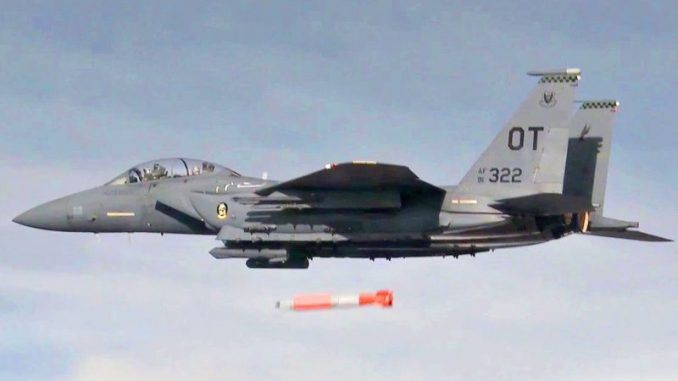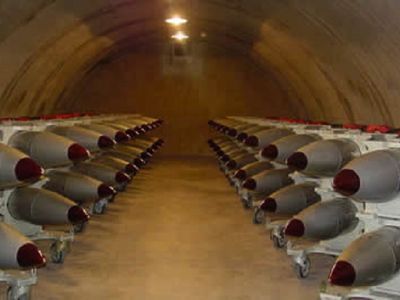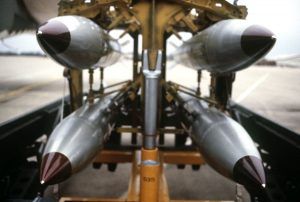
In Turkey‘s Incirlik Air Base there is a vault containing up to several dozen intermediate-yield strategic and tactical nuclear weapons.
The B61 variable yield nuclear gravity bomb is a free-fall thermonuclear weapon that can easily be attached to the wings of an aircraft.
In the wrong hands the weapons could be devastating as one B61 could have over ten times the yield of the bomb that destroyed Hiroshima at the end of world war two.
 Stars and Stripes reports:
Stars and Stripes reports:

BYPASS THE CENSORS
Sign up to get unfiltered news delivered straight to your inbox.
You can unsubscribe any time. By subscribing you agree to our Terms of Use
The B61 gravity bombs are considered small, though some could have yields more powerful than the atomic bomb that destroyed Hiroshima, Japan, in 1945. Given the attempted coup and increasing instability of Turkey, they worry one San Antonian, a former commander of all Air Force and Navy strategic nuclear weapons.
Retired Air Force Gen. Eugene Habiger said the U.S. missile umbrella is its main nuclear deterrent and the bombs no longer have any military usefulness. Yet 200 of them are still in NATO’s European arsenal, along with 62,000 U.S. troops, because European policymakers have wanted to make sure the United States is part of any war with Russia from the first day of conflict, he said.
“There’s a risk of having nuclear weapons; I don’t care where they are,” said Habiger, who ran the San Antonio Water System after he left the service. “It’s a very, very dangerous weapon in terms of military consequences, political consequences, and I think what happened in Turkey highlights the potential unintended consequences of having nuclear weapons forward deployed if there is no military requirement.”
The attempted coup in Turkey a week ago and the resulting crackdown against the military, police, judiciary, press and public employees by its elected strongman, President Recep Tayyip Erdogan, have challenged Turkey’s democratic status and Ankara’s continued ability to be part of the multinational coalition fighting ISIS. Tens of thousands have been swept up by the government in response to the coup — one of them the Turkish commander of the Incirlik base.
Washington had already ordered dependents of diplomats and military personnel out of southern Turkey in late March because of rising terrorist threats.
The Air Force’s training command in San Antonio confirmed Friday that some of the dependents were relocated here and elsewhere in Texas but would not say how many.
The coup also triggered concerns about military equipment falling into the wrong hands. The Turkish government said all its assets, including F-16 fighters, were in its control, the Associated Press reported. American aircraft based at Incirlik, including A-10 close-air support jets and drones, have resumed strikes on ISIS targets in Iraq and Syria after the government briefly closed its airspace.
But worries persist.
“It looks to me that Erdogan has made some severe mistakes in regard to reacting to this coup,” syndicated columnist Austin Bay, a retired Army Reserve colonel and Iraq veteran, said early this week. “His reaction is severe and at this point it appears to me to be unjustified.”
“Scenarios of doom regarding U.S. assets” are cause for concern but appear to be overstated, added Bay, author of the book “Ataturk: The Extraordinary Life and Achievements of the Greatest General of the Ottoman Empire.”
Still, for Habiger and other experts, including GlobalSecurity.org’s John Pike, the failed coup was a chilling reminder of the risks of keeping nuclear weapons on foreign soil. The risk of losing them is remote, they said. But they wonder about the wisdom of keeping them in Turkey.
Retired Gen. Ronald Fogleman, a former Air Force chief of staff, said American involvement in storing tactical nuclear weapons overseas ensures they are secure, but he agreed it might be time to reassess their presence in Europe.
“There are other things, I think, we ought to be worried about,” he said. “Although it’s certainly something that should be on the agenda and … maybe it’s time to relook at the whole issue and are they still serving the purpose that they were.”
The Pentagon will not acknowledge the existence of nuclear bombs on Incirlik Air Base. “It is our policy to not comment on the location of strategic tactical assets,” spokeswoman Henrietta Levin said.
But Habiger, 77, a former B-52 bomber pilot who led the Strategic Command from 1996 to 1998, in charge of nuclear weapons in the continental United States and on U.S. submarines, said some of the B61 bombs are in vaults at Incirlik and that others are in Germany, Belgium, Italy and the Netherlands.
They are NATO weapons under Air Force control and their purpose, he said, is purely psychological. Europe has never forgotten that America tried to avoid both world wars, Habiger said. And Europe is aware that American politicians have been backing away from decades of cold war internationalism, with GOP presidential nominee Donald Trump raising questions about the future U.S. commitment to NATO.
“Is NATO going to attack Russia? Who is NATO going to attack with nuclear weapons? That’s a rhetorical question,” Habiger said. “Why does NATO need nuclear weapons? Except for their own psycho-social security, to say, ‘We have a nuclear capability.’”
Pike, who has long studied nuclear weapons, said the yields on the bombs stored in Europe range from a few hundred tons to 160 kilotons and noted that the Hiroshima bomb — at about 15 kilotons — incinerated a 2- to 3-mile radius.
If used, the bombs would be delivered by F-16 fighters. While the Pentagon said the United States has no F-16 jets at Incirlik, it has two squadrons at Aviano Air Base in Italy. Those and other aircraft occasionally rotate through Incirlik, but they also could come from the United States. Pike noted that crews certified to fly nuclear warheads could be quickly deployed to the region if a crisis arose, noting, “They’re not there now because they just don’t need them. They’re not welded to the ground.”
The United States doesn’t disclose the number of tactical nuclear weapons it has, but President George W. Bush quietly reduced the number from about 450 to about 200 over the course of his administration, defense analyst Loren Thompson said.
There are four versions of the B61 that carry different yields, for tactical or strategic purposes, and they are small enough to place under a fighter’s wings and possibly could be carried by Turkish pilots, Thompson said.
“The way in which these weapons have been deployed in the past, they could potentially be delivered by host-country crews rather by U.S. crews,” said Thompson, of the Lexington Institute. “When you ask a country to store your nuclear weapons on their territory, they’re going to ask for something in return, and usually that something is some form of control.”
That gives Turkey’s leaders a card to play, but former Air Force Secretary F. Whitten Peters said they have another: Incirlik’s role as a critical hub for U.S. military aircraft throughout conflicts in the region over the past 25 years.
“I think you certainly can revisit the policy, but Incirlik Air Force Base is just too important a base for us to give up at this point,” he said. “And I think that’s pretty strong leverage, frankly, given where we are in the Middle East, and given how important Incirlik has been, certainly since the last Gulf War and probably before that.”

Edmondo Burr
CEO
Assistant Editor
Latest posts by Edmondo Burr (see all)
- Police Arrest Suspect In Supermarket Baby Food Poisoning - October 1, 2017
- Seoul Secures Data From Electromagnetic Interference By N Korea - September 30, 2017
- The ‘World’s First Internet War’ Has Begun: Julian Assange - September 30, 2017


Be the first to comment